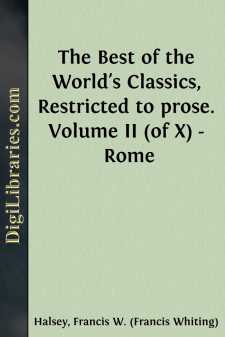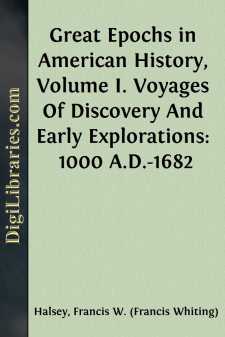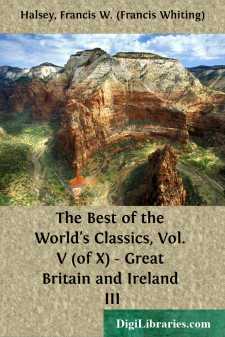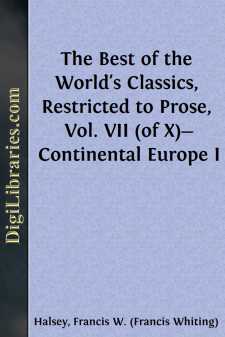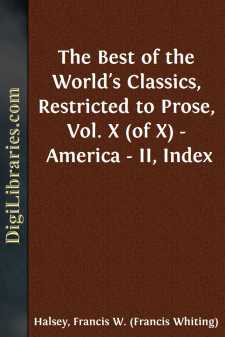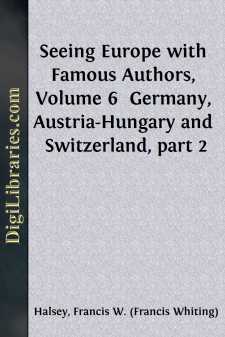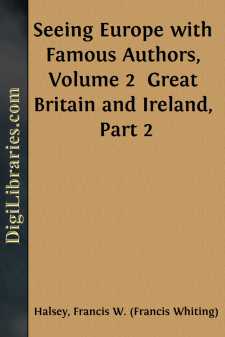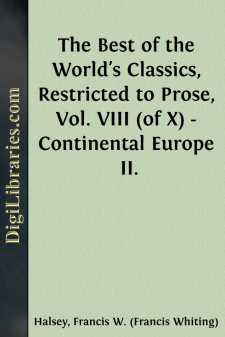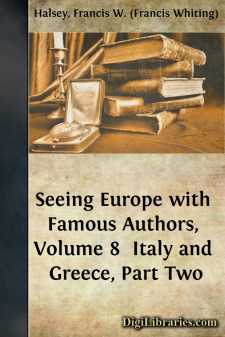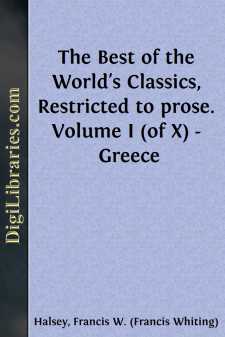Categories
- Antiques & Collectibles 13
- Architecture 36
- Art 48
- Bibles 22
- Biography & Autobiography 813
- Body, Mind & Spirit 142
- Business & Economics 28
- Children's Books 17
- Children's Fiction 14
- Computers 4
- Cooking 94
- Crafts & Hobbies 4
- Drama 346
- Education 46
- Family & Relationships 57
- Fiction 11829
- Games 19
- Gardening 17
- Health & Fitness 34
- History 1377
- House & Home 1
- Humor 147
- Juvenile Fiction 1873
- Juvenile Nonfiction 202
- Language Arts & Disciplines 88
- Law 16
- Literary Collections 686
- Literary Criticism 179
- Mathematics 13
- Medical 41
- Music 40
- Nature 179
- Non-Classifiable 1768
- Performing Arts 7
- Periodicals 1453
- Philosophy 64
- Photography 2
- Poetry 896
- Political Science 203
- Psychology 42
- Reference 154
- Religion 513
- Science 126
- Self-Help 84
- Social Science 81
- Sports & Recreation 34
- Study Aids 3
- Technology & Engineering 59
- Transportation 23
- Travel 463
- True Crime 29
Francis W. (Francis Whiting) Halsey
Francis Whiting Halsey (1851-1919) was an American journalist, editor, and author known for his contributions to literature and history. He served as an editor for "The New York Times" and authored several works, including "The Literary Digest History of the World War." Halsey's career was marked by his dedication to enhancing public understanding of historical and literary topics through his editorial and writing endeavors.
Author's Books:
Sort by:
CATO, THE CENSOR Born in Tusculum, Italy, in 234 b.c., died in 149; celebrated as statesman, general, and writer; questor under Scipio in 204; Consul in 195; served in Spain in 194; censor in 184; ambassador to Carthage in 150; one of the chief instigators of the third Punic war; among his writings are "De Re Rustica" and "Origines." OF WORK ON A ROMAN FARM When the owner of the farm...
more...
INTRODUCTION (Voyages of Discovery and Early Explorations.) Schoolboys have been taught from their earliest years that Columbus discovered America. Few events in prehistoric times seem more probable now than that Columbus was not the first to discover it. The importance of his achievement over that of others lay in his own faith in his success, in his definiteness of purpose, and in the fact that he...
more...
BOSWELL'S INTRODUCTION TO DR. JOHNSON Mr. Thomas Davies the actor, who then kept a bookseller's shop in Russell street, Covent Garden, told me that Johnson was very much his friend, and came frequently to his house, where he more than once invited me to meet him; but by some unlucky accident or other he was prevented from coming to us. Mr. Thomas Davies was a man of good understanding and...
more...
IMPERIAL POWER FOR GOOD AND BAD MEN Let us examine the nature of the spaciousness and continuance of empire, for which men give their gods such great thanks; to whom also they exhibited plays (that were so filthy both in actors and the action) without any offense of honesty. But, first, I would make a little inquiry, seeing you can not show such estates to be anyway happy, as are in continual wars,...
more...
The cemetery of Père Lachaise is the Westminster Abbey of Paris. Both are the dwellings of the dead; but in one they repose in green alleys and beneath the open sky—in the other their resting place is in the shadowy aisle and beneath the dim arches of an ancient abbey. One is a temple of nature; the other a temple of art. In one the soft melancholy of the scene is rendered still more touching by the...
more...
HUNGARY (Continued) HUNGARIAN BATHS AND RESORTS[1] BY H. TORNAI DE KÖVËR In Hungary there are great quantities of unearthed riches, and not only in the form of gold. These riches are the mineral waters that abound in the country and have been the natural medicine of the people for many years. Water in itself was always worshiped by the Hungarians in the earliest ages, and they have found out through...
more...
It was a comfort as I came out of the Albert Memorial Chapel, and rejoined nature upon the Terrace, to mutter to myself those fine lines which not a hundred years ago everybody knew by heart: "The boast of heraldry, the pomp of power, And all that beauty, all that wealth ere gave, Await alike th' inevitable hour. The paths of glory lead but to the grave,"—a verse which I found it not bad...
more...
THE TYRANNY OF THE AMERICAN MAJORITY I hold it to be an impious and execrable maxim that, politically speaking, the people has a right to do whatever it pleases; and yet I have asserted that all authority originates in the will of the majority. Am I then in contradiction with myself? A general law, which bears the name of justice, has been made and sanctioned not only by a majority of this or that...
more...
THREE FAMOUS CITIES IN THE STREETS OF GENOA BY CHARLES DICKENS The great majority of the streets are as narrow as any thoroughfare can well be, where people (even Italian people) are supposed to live and walk about; being mere lanes, with here and there a kind of well, or breathing-place. The houses are immensely high, painted in all sorts of colors, and are in every stage and state of damage, dirt,...
more...
INTRODUCTION Ever since civilized man has had a literature he has apparently sought to make selections from it and thus put his favorite passages together in a compact and convenient form. Certain it is, at least, that to the Greeks, masters in all great arts, we owe this habit. They made such collections and named them, after their pleasant imaginative fashion, a gathering of flowers, or what we,...
more...


